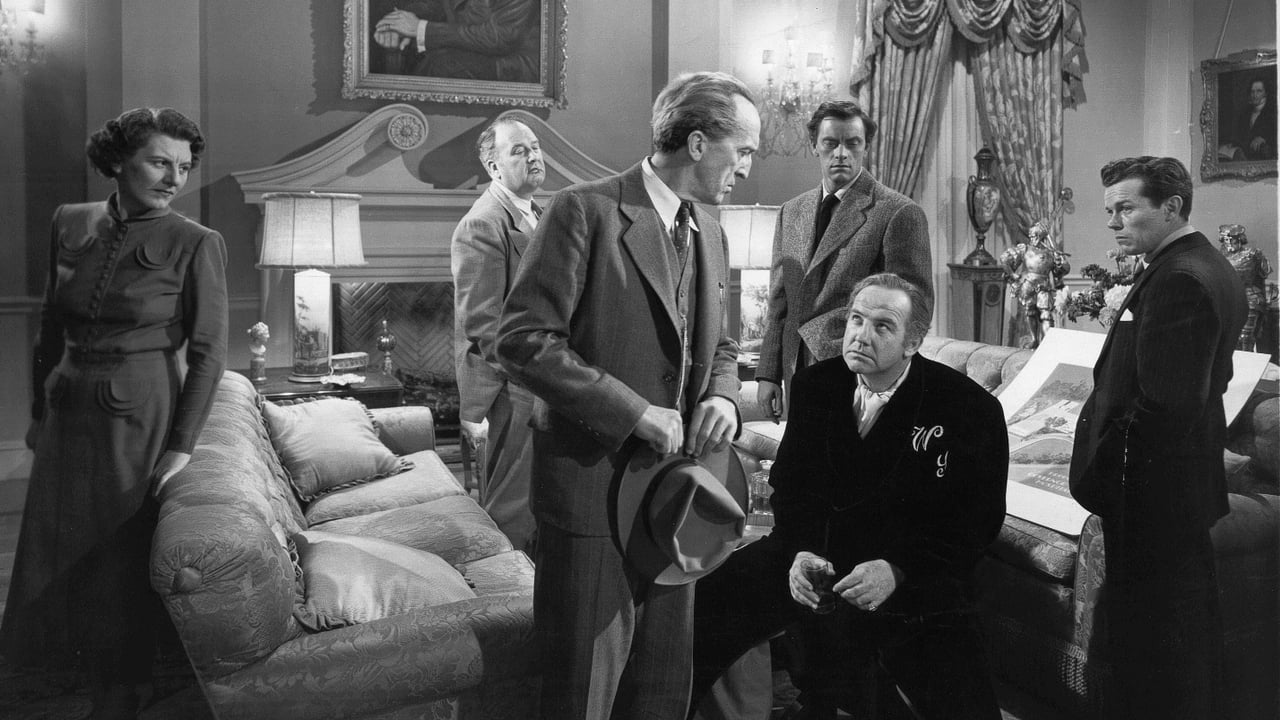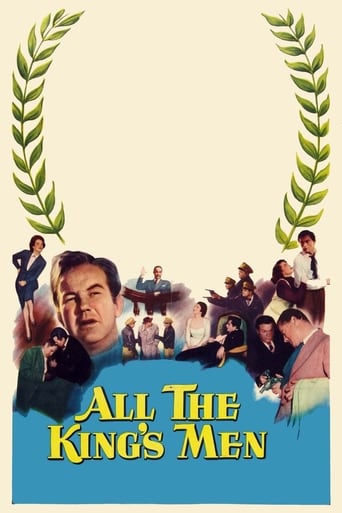



brilliant actors, brilliant editing
Simple and well acted, it has tension enough to knot the stomach.
View MoreThere is just so much movie here. For some it may be too much. But in the same secretly sarcastic way most telemarketers say the phrase, the title of this one is particularly apt.
View MoreOne of the best movies of the year! Incredible from the beginning to the end.
View More"All the King's Men" was based on a novel by Robert Penn Warren, which in turn was based upon the career of the controversial politician Huey Long. The Long figure here is Willie Stark, a farmer from a poor rural district in an unnamed state. Stark begins his career as a campaigner against corruption in local government and qualifies as a lawyer so that he can help his impoverished neighbours, but is unsuccessful in an attempt to become county treasurer. He is persuaded to run for governor, unaware that he has been nominated by supporters of the incumbent in the hope that Stark will split the vote and thereby harm the chances of the opposition candidate. In the course of his campaign, however, Stark discovers hitherto untapped powers of oratory and becomes a popular figure; he finishes second in the poll, only losing narrowly. Four years later he runs again and wins. The story is told from the point of view of a young journalist, Jack Burden. Burden comes from one of the state's aristocratic "old money" families, who generally despise Stark as a vulgar populist. Burden, however, initially admires Stark as a man who will get things done. Other important characters are Burden's equally aristocratic girlfriend Anne Stanton, her brother Adam, a doctor, and their uncle, a judge.Burden resigns from his newspaper to become a worker on Stark's staff, and the film tells the story of gradual disillusionment with Stark who, once in office, becomes as corrupt and autocratic as the politicians he once campaigned against. Judge Stanton, appointed as the state's Attorney-General, resigns when he realises that Stark is protecting an associate who is guilty of embezzlement. Stark's private character also deteriorates when exposed to the temptations of power; once a teetotal family man he becomes a drunken womaniser, taking (among others) Anne as his mistress. The film was a great success when it was released in 1949, both critically and commercially. It won the "Best Picture" Oscar, with "Best Actor" going to Broderick Crawford and "Best Supporting Actress" to Mercedes McCambridge as Stark's aide Sadie. Robert Rossen (who also acted as writer and producer) was nominated for "Best Director" but lost out to Joseph L. Mankiewicz. These awards were certainly well-deserved, especially Crawford's as he gives a spellbinding performance as Stark, the simple, bumbling country hick turned would-be dictator. The film has been compared with that other great study of the corruptions of power, "Citizen Kane", although unlike Orson Welles neither Rossen nor Crawford went on to become a great Hollywood icon. Rossen, who died while still in his fifties, only made ten films, none of the others as famous as this one, although some of them are certainly good. Crawford, this film apart, is more remembered for his work in television, especially the police drama "Highway Patrol", than in the cinema. The film was made shortly after the end of World War II and during the early part of the Cold War. It is therefore perhaps unsurprising that Rossen draws clear parallels between Stark's career and those of Hitler, Mussolini and Stalin- the balcony oratory, the torchlight rallies, the giant banners with portraits of the Leader hanging from public buildings and the strong-arm tactic used to silence opponents of the regime. (The word "stark" is, significantly, German for "strong"). Yet Rossen is more objective than one might imagine. The film is not just a long diatribe against dictatorship and in favour of democracy. Even when disillusioned Burden continues to work for Stark because, whatever his other faults may be, Stark makes good on his boast to be a man who gets things done. He is responsible for an ambitious public works programme to provide the state with much-needed schools, hospitals and highways, and it is this which accounts for his continuing popularity among the state's poorer inhabitants, especially in rural districts, who refuse to believe stories of Stark's corruption and abuse of power. By contrast, the clique of old-money politicians who controlled the state before Stark's rise to power never did anything to benefit anyone other than themselves. They, moreover, were not only corrupt but also equally capable of resorting to strong-arm tactics, although because of their control of the media these were rarely reported. You could even draw from the film the moral that, as Tim Rice put it, "There is evil, ever around fundamental, system of government quite incidental", and that you might as well vote for the sonofabitch who gets things done rather than for the sons of bitches who don't. The film therefore effectively has a double meaning. On the one hand, it can be seen as an "it could happen here" warning against the dangers of dictatorship. Some historians believe that, had Long not been assassinated in 1935, he could have become an American Mussolini. On the other hand, it is also a warning against the dangers of democracy, especially the temptation to regard winning elections as an end in itself, a game to be played for the benefit of the politicians rather than for the benefit of those who elect them. (Since the end of the Cold War this has become a temptation to which Western democracies have become particularly prone). It is this complexity of meaning which, along with its great central role, some good supporting performances and an intelligent script, makes "All the King's Men", in my opinion, the greatest film ever made about American politics. 10/10
View MoreCity reporter John Ireland (as Jack Burden) is sent to cover an unusual small-town campaign for county treasurer. The underdog receiving media attention is populist candidate Broderick Crawford (as William "Willie" Stark), uncommonly known as an "honest politician." Upon arriving, Mr. Ireland finds corrupt local officials threatening to arrest Mr. Crawford, who draws crowds with his campaign speeches. They have Crawford's schoolteacher wife Anne Seymour (as Lucy) fired and beat up his handsome son John Derek (as Tom). Crawford's political career is a certainly a challenge. Ireland would rather be with pretty Joanne Dru (as Anne Stanton), but becomes attached to Crawford...Based on the Pulitzer Prize-winning 1946 novel by Robert Penn Warren, "All the King's Men" has things to say about political corruption that are still relevant, today. The story is very skillfully adapted, by director Robert Rossen. He keeps the narrative flowing briskly and elicits great performances, all around. With many scenes involving multiple characters, the director keeps everyone in place. There are times when Mr. Rossen and crew covey much with three or four players and only a few seconds of silent screen time. Obvious artistic moments strengthen scenes without being too showy; for example, children at a carnival provide chaos as Broderick experiences the aftereffects of alcohol...Sexual and romantic relationships are telegraphed by studying the faces and manners of Ms. Seymour, Ms. Dru and Mercedes McCambridge (as Sadie Burke). You could turn down the sound and gather much information by watching the faces of "All the King's Women". In her first feature film appearance, Ms. McCambridge won most of the year's big "Supporting Actress" awards. She's marvelous, but the story should have had at least one "romantic" scene between McCambridge and Crawford; filmmakers may have felt the two would look unappealing together, and may have cut love scenes somewhere during the process. Crawford was clearly the year's consensus "Best Actor" winner...The often misplaced, but most coveted, "Academy Award" for Rossen was as "Best Picture" producer rather than director. "Oscar" nominated Ireland as "Supporting Actor" and he very likely outperformed that group, but he lost; it's just as well, Ireland is one of two leading, not supporting, performers in "All the King's Men". Others in the cast to keep an eye on include doctor Shepperd Strudwick (as Adam Stanton) and devoted Walter Burke (as Sugar Boy). The film makes a strong case for incorporating an "ensemble" acting award. To spite the strong effort and acting impressions, the characterizations are sketchy and secondary; the main characters are politics and corruption.********* All the King's Men (11/8/49) Robert Rossen ~ Broderick Crawford, John Ireland, Mercedes McCambridge, Joanne Dru
View MoreThe Academy Awards choice for Best Film of 1949 follows naive backwoods reformer Willie Stark (a thickly fictionalized senator Huey Long), picked by a rival candidate for State Governor to "split the hick vote". But when he realizes how he's been used, Stark doesn't just get mad; he gets even, organizing a ruthless political machine that eventually consumes him. Watching Oscar winner Broderick Crawford transform the character from honest do-gooder to populist demagogue is electrifying, but it's a shame this adaptation of Robert Penn Warren's Pulitzer Prize winning novel had to lean so hard on pulp fiction melodrama, beginning with the familiar crutch of voice-over commentary, and from a rather bland protagonist: journalist John Ireland, trapped on the Willie Stark bandwagon. The point is well made and worth repeating: politicians can't use bad money for good deeds without being strangled by all the strings attached, but the message is lost between all the juicy plot twists: a suicide, an assassination, an auto accident crippling the Governor's star quarterback son, so forth and so on.
View MoreAll the King's Men (1949)The reference to Humpty Dumpty isn't lost here--the hero, a likable protagonist headed for a fall, is the egg, the egg who would be king. We, the people, are the king's men. And all of this is not fantasy, but a fantastical version of the real Huey Long story, the governor and then senator who didn't exactly fall to pieces, but who became a troubling despot of a democratic sort.Long was a come-from-nowhere governor of Louisiana just as the Depression began. His motto: every man a king. Widely admired and hated to this day, he makes natural movie material, and this 1949 version focuses on just that main thread of gutsy idealism and bald powermongering. And the connection between the two, which is a kind of megalomaniacal ego, a charisma borne of blindness (which people admire because it seems so honest), and raw energy. The later movie (2006) is painfully strained and full of itself, and I'd avoid it completely. This one is not a masterpiece, but it has a fast pace, a lot of great acting, and a slightly better sense of authenticity, enough to succeed.Key to its success is Broderick Crawford, whose acting lifts a mundane (if smart) kind of filming to a higher pitch. Director Robert Rossen is totally in control, however, and if there is little magic to the writing or the construction of the film, in film-making terms, the story is told with such compact force, all you notice is Crawford and the twisting turns of events.
View More